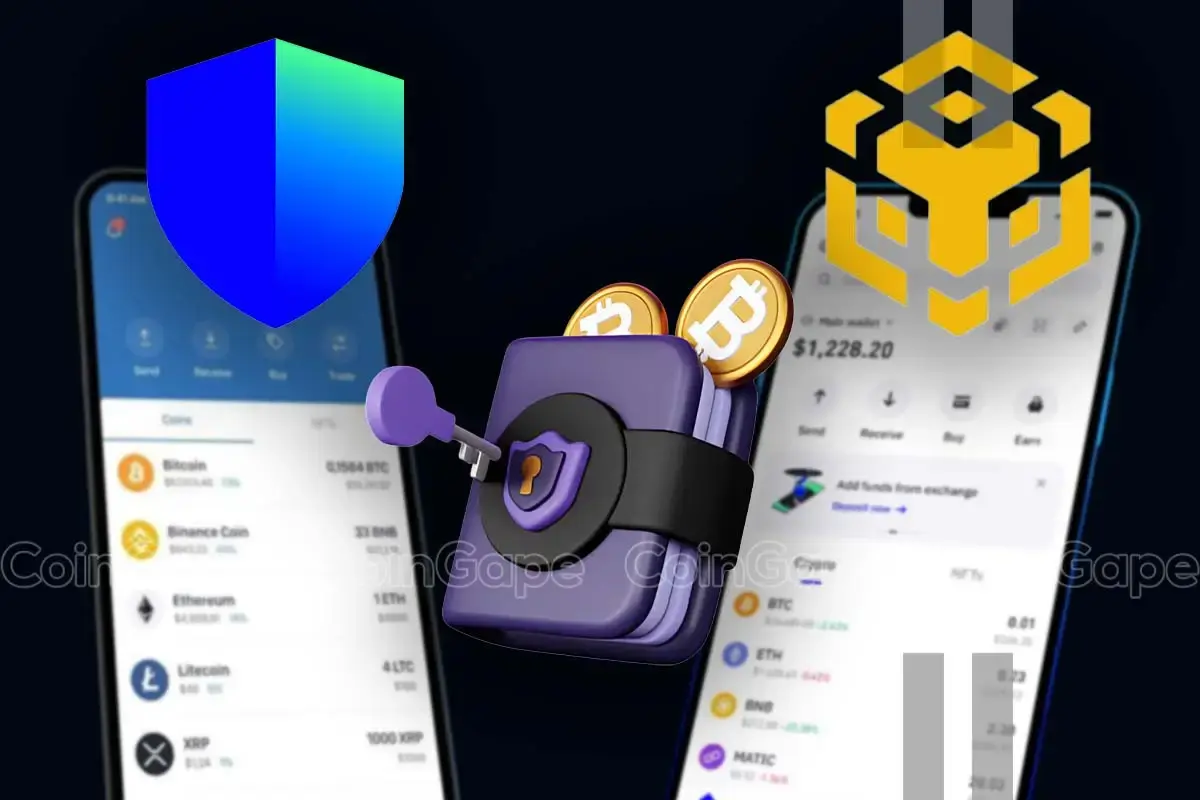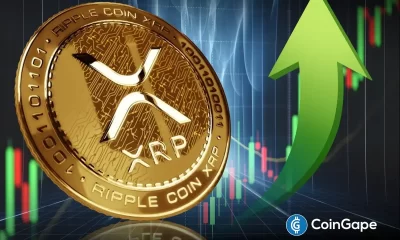Opinion
Insights from Trust Wallet and BNB Chain on Crypto Wallet Security
Published
4 months agoon
By
admin
Security of tokens should be the number one priority of all crypto users. Recent incidents such as the DEXX security incident where at least $21 million worth of user funds was lost, are evidence of the inherent risks of the crypto world. In this scenario, attackers compromised over 1000 users by simply taking advantage of the existing shortcomings of the platform’s private key management.
The One Golden Rule of Crypto: Not Your Keys, Not Your Coins
Begin by choosing the right wallet and using the best security practices on offer. There are two types of crypto wallets – Hot wallets, which have internet connectivity and cold wallets, which are stored offline. Apart from these two, there are smart contract wallets which can be programmed.
Now let’s examine BNB Chain and Trust Wallet’s opinion on crypto wallet safety and how users can make informed decisions based on them.
Lessons learnt from the DEXX security Issue.
Before we dive into what crypto wallet security implies, it is necessary that we understand more about the recent security incident mentioned before.
DEXX, which is a reputed on-chain trading terminal platform, experienced an attack on November 16th, 2024, which primarily affected Solana funds. As a result of this attack over $21 million worth of user funds were lost, with about 1000 victim addresses.
The community is concerned after finding out that more than 9000 unauthorized transactions were used in the attack. Subsequent investigations into several compromised addresses found out that the stolen funds remain in the hacker’s possession. This points to the fact that a single offender perpetrated the incident.
The root cause of the incident was identified as vulnerability in the private key storage of the platform’s server. The API for exporting wallets from DEXX returned private, unencrypted keys. This reveals that DEXX stored private keys on its servers. All this, despite branding itself as a non-custodial wallet – what an irony.
Several measures can be taken to prevent this sort of breach.
- Avoiding Storage of Private Keys: Private keys should never have been stored on DEXX’s servers, as this practice directly contradicts its non-custodial claims.
- Encryption: Sensitive data should be encrypted during transmission and storage to protect delicate user information.
- Regular Security Audits: Regular security audits should have been conducted to identify vulnerabilities before they were exploited.
Checking whether selected wallets have gone through proper audits is key for users. When investing a substantial amount of funds, it’s better to choose reputed and time-tested platforms to decrease the chances of loss.
What to Look for in a Secure Wallet?
Consider the following features when looking for a secure cryptocurrency wallet.
Secure Key Management
Reliable wallets should commit to secure key management. They should ensure that all private keys are generated, stored and managed in the most secure manner possible. Some of the key aspects of secure key management include:
Backup and Recovery: Users should be provided with secure backup options. They should also have the ability to recover private keys or seed phrases when needed.
Seed Phrase Encryption: Ensure that the wallet has strong encryption measures for seed phrases.
Non-custodial design: Go for wallets that do not store their private keys on centralized servers. User should have full control over their private keys.
Wallet History and Security Licenses
Selecting a secure wallet is undoubtedly the most challenging thing a new Web3 user has to do. Many users face difficulties in determining whether a wallet is secure and follows the best practices and protocols.
With that being said, follow these steps to choose a secure wallet.
- Begin by checking the past records of the wallet and opting for one with a proven history and good reputation. These are likely to follow strict security protocols.
- Check whether the wallet has passed multiple audits and holds a valid security license.
Follow these above steps to make informed decisions.
Security Scanners and Alerts
Users seldom understand the full implication of a transaction when performing them or exploring dApps. When receiving a given message or prompted transaction from a dApp, it requires a lot of trust from the user’s end. Why? – because its almost impossible to know the full extent of the transaction’s consequences, just by looking at the on-screen prompt.
Fortunately, Trust Wallet’s Security Scanner feature solves this problem. This feature is responsible for analyzing transactions and identifying suspicious patterns, even before the funds are sent. This reduces the chances of users accepting or signing fraudulent or unwanted transactions. This feature alone has safeguarded $450 million from being stolen.
Wallets with this feature simulate the transaction. They then provide the results to the users instead of just displaying the message or the transaction the DApp requests. This ensures that the client’s action is the same as their expectations.
Crypto wallets are known as the gateway to interacting with dApps. But since the users do not fully understand the imitations of transactions, the security scanner feature should be used.
Step-by-Step Guide for Choosing a Wallet
The main tool for interacting with the crypto ecosystem is the crypto wallet. It functions as the gateway to dApps and blockchain networks. This makes choosing the right wallet very important, even if one is trying to play blockchain games as opposed to storing assets or executing transactions.
Before you select a wallet, ask these questions to yourself.
- Do you want to hold assets long-term or are you simply a day trader?
- What is the maximum amount of risk you can take?
- Do you want to engage with dApps, or do you need basic storage or transaction capabilities?
Crypto Wallet Types
Crypto wallets can come in two forms – software wallets and hardware wallets.
Software wallets have to be accessed using smartphones, browsers or computers. Users can conveniently connect with Web3 decentralized applications or get access to their digital assets simply by clicking.
This feature makes them popular among crypto traders. The main advantage of software wallets is the level of functionality and immediate accessibility they provide. They are versatile, capable of connecting to dApps seamlessly and be used for use cases such as crypto payments and digital IDs.
A good example of a software wallet is Trust Wallet. It is compatible with both desktops and mobile devices.
When using a hot wallet on your PC or mobile, it’s crucial to install antivirus software for malware protection to ensure the security of your personal computer or phone. Hardware wallets on the other hand are physical devices used to store private keys in an offline environment. They are considered the safest option for crypto management and storage for this reason. It stores private keys away from internet connectivity.
Hardware wallets are ideal for users who prefer an extra layer of physical security or wish to store their crypto assets without frequent transactions. They are also suited for those who like to store their crypto long-term. However, the trade-off is not convenient, as things like transaction execution can take longer.
Can hardware and software wallets be used simultaneously?
It is possible to use hardware and software wallets at the same time. You can connect Ledger, which is a hardware wallet to Trust Wallet’s( software wallet) browser extension feature.
Are smart contract wallets safe?
Smart contract wallets use smart contracts that can function as wallets and provide features such as signature validation, asset ownership, and execution. Most use the ERC-4337 industry standard to develop a smart contract wallet even though other methods exist.
Smart contract wallets can bolster security and usability compared to traditional wallets. With smart contract wallets, users can get multi-owner accounts, flexible key management, token gas payments, account recovery, batch transactions, and advanced UX with security audits.
Conclusion
The world of cryptocurrency has both potential rewards and inherent risks. The key here is to stay informed and secure. Prioritize security by choosing wallets that can provide the above-mentioned features. Remember, it’s essential to make well-informed decisions and understand your needs before you choose a particular type of wallet.
Lastly, security is a personal thing. Stay vigilant, avoid sharing personal information and use different storage methods.
Disclaimer: This article is an opinion piece. The content may include the personal opinion of the author and is subject to market conditions. Do your market research before investing in cryptocurrencies. The author or the publication does not hold any responsibility for your personal financial loss.
Source link
You may like


Analyst Says Solana-Based Memecoin Going Much Higher, Sees PENGU Facing ‘True Test’ After April Surge


Nike sued for $5 million over its shutdown of NFT platform RTFKT


Biological Age vs. Chronological Age: Redefining Age in the Digital Era


TRUMP whale regrets sale, pays double to buy back meme coins


Stripe Tests New Stablecoin Project as $3.7T Market Looms


Falling Wedge Pattern Confirms $264 target

Disclosure: The views and opinions expressed here belong solely to the author and do not represent the views and opinions of crypto.news’ editorial.
Although some believe that crypto PR and communications efforts should slow down when the markets are cooling off, it couldn’t be further from the truth. Sure, during crypto winters, product development teams huddle together to work on building their solutions—and that’s great—but these are also the ideal times for brand building.
Indeed, when the market is going through a crypto slowdown, the strategic brands are seizing the opportunity to strengthen credibility while everyone else is hibernating. And when the market inevitably heats up, this strategy will position such players ahead of the competition.
Now, not all might agree with this point of view, arguing that pushing PR during a downturn is tone-deaf. Others might see slow market communications as unnecessary noise when product development should be the only priority. But visibility isn’t vanity—it’s strategy, and it’s easier to get noticed in calmer markets.
Slower news, hungrier journalists
As the movements in the crypto market slow down, so does everything else that relates to it, including newsrooms. In other words, journalists have more space (and patience) for stories that go beyond mere price action. There are no big stories of exploding digital assets. Bitcoin (BTC) is nowhere near reaching a new all-time high, and altcoins are taking the cue from the industry’s number one, sleeping it off themselves.
Thus, when the hype and the noise in the crypto sphere die down, media outlets are on the lookout for stories worth telling. In such moments, true innovation and strong projects get their chance to shine and get real editorial interest, instead of getting lost among drama-driven headlines.
Small news can be perceived as newsworthy in a bear market
Here’s a secret—during a bull run, not even a $10 million funding round might turn heads. It’s just too common when there’s money flowing everywhere across the board. To illustrate, an insider source at a crypto media powerhouse once said that their “funding news coverage threshold is a minimum of $10 million, with exceptions.”
This might sound counterintuitive at first, but in a more bearish market sentiment, that same outlet might just be interested in a mere $5 million, or even a $1.4 million seed round, like the one recently raised by crypto payment hub Lyzi to expand its Tezos-based service.
In other words, Lyzi has just told the world that it’s there and constantly working on building its product. Arguably, in a period of market pessimism, it would be one hell of a smart and well-timed PR move, and the best part—the likes of CoinDesk might pick it up.
Pick up the mic when no one else is talking
Providing expert commentary when the industry goes silent becomes even more valuable. Journalists still seek third-party sources and insights, and this is your chance to establish yourself as an authoritative figure in the sector, to whom journalists will come back when the bull market returns.
This means that when it’s all quiet on the crypto front and a journalist comes knocking at your door, be ready. Hiring a good PR firm that will lead you, shape your story, and provide the stage is certainly the right move, but it’s up to you to step up with confidence and claim the spotlight.
Execution still matters
With this in mind, don’t mindlessly drop news just for the sake of it. Be strategic about timing, like holidays, conferences, and other major events that might overshadow your news, as well as the tone—this isn’t the time to brag but display resilience and value.
Also, use the time of market bearishness to build your reputation and flesh out your digital footprint through earned media placements in trusted crypto outlets. Potential users, partners, and investors will look you up online, so make sure they have good things to read about you—that’s your PR working in the background.
The real bottom line
All things considered, crypto PR in times of market stagnation and bearish sentiment is not so much about creating hype as it is about demonstrating real substance. It’s about crafting a narrative that portrays you as the crypto player who can weather the blizzard, better positioning your brand.
So, the next time you’re considering staying silent during a crypto downturn, think again. You might miss out on the best PR opportunities of the cycle, as at this time, you could get more attention than usual.
Don’t wait for the bull to charge—make your mark when the field is clear.

Afik Rechler
Afik Rechler is the co-founder and co-CEO of Chainstory, a results-driven crypto PR agency. He specializes in crypto communications and search-driven content marketing. Afik has been in the crypto industry since late 2016, helping blockchain businesses meet their marketing and communications goals.
Source link

Disclosure: The views and opinions expressed here belong solely to the author and do not represent the views and opinions of crypto.news’ editorial.
Crypto is out of narratives, out of patience, and running out of time to matter. The only way out is forward—by building products people actually use and don’t have to think about. For the past several months, AI agents have been pitched as that future, but most of them are just noise: flashy wrappers that don’t actually do anything.
In the middle of a macro meltdown, with Ethereum’s (ETH) value against Bitcoin (BTC) hitting five-year lows and Bitcoin trading like a high-beta tech stock, no one is begging for another DEX, bridge, or wallet extension. The problem isn’t discoverability. It is a utility. We’ve built an industry optimized for speculation, not service. A financial arcade, not a functioning economy. Most crypto apps don’t have users because they don’t solve anything real.
Volatility is the tell. If crypto were used at scale, real demand would anchor the price. But when macro conditions shift, the whole sector moves in lockstep—because actual usage doesn’t matter. That’s not a UX issue. That’s a product problem.
If crypto wants to survive this phase—let alone escape the echo chamber in the next cycle—we need to stop building abstractions for each other and start building real products for real people.
Why it keeps happening
Crypto has never grown out of its builder-for-builder roots. Success is defined by shipping, not retention. We reward composability over usability. Launches over DAUs. TVL over usefulness.
That’s how we ended up with a wave of AI agents that look good in demos but fall apart in practice—built to impress, not to endure. Builders build for other builders. Teams optimize for token launches, not long-term users. Most roadmaps are driven by narrative timing, not customer feedback. The result? Products that impress on crypto Twitter but don’t matter to anyone outside of it.
User experience is still considered surface-level polish when it should be foundational. We talk about onboarding like it’s a marketing problem, not an architectural one. And we wonder why users churn faster than altcoins collapse.
Not all AI agents are the answer
Take a look at what’s been happening with AI agents in crypto. We’re pretending automation means intelligence. But users don’t need agents that talk. They need agents that do.
And they need agents that can operate with intent: taking autonomous action, interacting onchain, and accruing value, not just information. If this is going to be the narrative of the next cycle—and it might be—we need to raise the bar. What’s missing isn’t another chatbot. It’s autonomy, action, and economic alignment.
The next generation of agents must be onchain actors—agents with memory, incentives, and agency. Not just slick AI interfaces, but participants in the network itself.
What a real product looks like
A real product solves a real problem—clearly, quickly, and without friction. It doesn’t need an explainer thread. It feels like magic, not a UI puzzle. In crypto, the magic moment happens when a product abstracts away the protocol, when it does something for the user without making them think about networks, wallets, or bridges.
Imagine an AI agent that quietly monitors your wallet, and the moment your airdrop unlocks, it claims it and sells at optimal execution—no prompts, no extra steps. At the same time, it watches gas prices and dips into stable-yield reserves you forgot you had, automatically buying the dip without you lifting a finger. When you need to bridge funds or execute a transaction, it instinctively reroutes you through the cheapest and fastest network available, all without asking which chain you’re on or forcing you to approve a dozen steps. That kind of seamless automation isn’t a feature. It’s the foundation of a real product.
These aren’t features. They’re outcomes. And they’re the foundation of actual adoption.
And so these are the kinds of applications crypto needs to hone in on and devote resources to. Real consumer AI agents are a breakthrough here. They act on behalf of users, claiming, trading, and coordinating. They reduce surface area. They make infrastructure invisible. They don’t rely on speculative hype to attain value; they provide an actual service.
That’s how we get crypto out of the power user corn maze and into everyday relevance.
What needs to change (and why now)
This isn’t just about good design. It’s about product discipline. And the timing has never been better. We’re not just in a bear market. We’re in a trust correction. Retail is gone. The ETF narrative is priced in. Altcoins are bleeding out. The Fed and fiscal policy are driving every headline.
This is the best possible time to build—because no one’s watching. There’s no pressure to chase yield or force hype. There’s room to build quiet conviction around something real. So what should builders actually do?
First, they need to design for behavior, not just composability. It’s not enough that components can plug into one another—what matters is whether people actually use them. Real product design starts with the user’s motivation and workflow, not with modularity.
Second, builders should use automation and agents to reduce decision fatigue. Most crypto products overwhelm users with options. The goal should be to eliminate choices, not add more. A great product handles complexity behind the scenes so the user doesn’t have to think.
Third, it’s time to prioritize retention over liquidity mining. If your product only works because there’s a token incentive attached to it, it’s not a product—it’s a promotion. Focus on building something people come back to without needing a bribe.
Finally, usability should be treated as infrastructure, not decoration. The interface is not the cherry on top—it’s the bridge between function and experience. If it’s not intuitive, it’s broken.
AI agents for consumers aren’t a gimmick. They’re the best shot we have at building something people actually return to. Not because they believe in your token. But because the product does something for them.
Stop building for nobody
We don’t need more tokenized interfaces. We don’t need more demos that explain themselves better than they perform. And we definitely don’t need another yield mechanic disguised as a product.
We need software that helps people get something done. That they come back to because it works, not because they’re speculating. Consumer AI agents are the clearest path to that future. Stop building apps no one uses. Start building ones that people don’t even have to think about.

Garrison Yang
Garrison Yang is the co-founder of Mirai Labs, a web3 development studio building intuitive consumer applications that make crypto usable—and useful—for everyone. With over 15 years of experience across engineering, strategy, growth, and product, Garrison blends technical depth with a marketer’s eye for impact. A former professional gamer, he brings a competitive edge and a deep understanding of user behavior to everything he builds. At Mirai, he’s focused on turning blockchain into something people actually use—without even realizing it.
Source link
AI
AI flattens creativity. Blockchain is how we save it
Published
1 week agoon
April 19, 2025By
admin
Disclosure: The views and opinions expressed here belong solely to the author and do not represent the views and opinions of crypto.news’ editorial.
Our timelines were just filled with a bunch of pastel Miyazaki’s ghosts. Studio Ghibli-style AI generations have become the internet’s new favorite aesthetic. PFPs and marketing campaigns were reborn overnight in the watercolor warmth of Spirited Away. Selfies rendered as soot sprites.
The results are charming yet deeply unsettling. Why? Because Hayao Miyazaki didn’t draw them––and no one asked permission. This isn’t just a copyright problem. It’s an authenticity problem where there is a growing inability to see, trace, or understand the origins of the content that shapes our culture.
In the chaos of AI-generated images and memecoins, we’re watching creativity get flattened, authorship obscured, and ownership erased. If that feels like a plague, it’s because it is.
The unfettered mess unleashed by generative AI has caused a powerful use case for blockchain to emerge: proof of provenance and onchain verifiability for agentic creation. By anchoring content to public, immutable ledgers, blockchain enables creators to prove authorship, timestamp originality, license works programmatically, and track derivatives across the network—without relying on centralized gatekeepers.
With the tools of blockchain, creators can participate in fairer, more transparent ecosystems that reward origin and empower open-source and composable content systems.
The collapse of creative clarity
Studio Ghibli has not been the only target. In late 2024, Philip Banks created Chill Guy, a laid-back dog meme that exploded into a half-billion-dollar meme token on Solana. But Banks never gave permission. His accounts were hacked. A false licensing deal was forged. When the truth surfaced, the token crashed 45% in 30 minutes.
Now imagine that story playing out across every medium, on a global scale. That’s exactly what’s happening with OpenAI’s recent co-option of Studio Ghibli’s IP. Now, AI’s tools can mimic any voice, style, or aesthetic—trained on unlicensed data scraped from the internet and any medium it can consume.
Amazon is replacing voice actors with AI. Manga localization is being outsourced to machines. Lawsuits from The New York Times, Getty, and independent artists are piling up. A major problem is that enforcement can’t keep pace with reproduction. The systems we rely on to manage content—from cloud drives to social platforms—cannot tell you where something came from.
They fail at proving provenance and, in turn, fail the creators whose livelihoods depend on IP rights. We’re building the next generation of digital culture on a foundation of guesses, not guarantees.
Creative authenticity requires new blockchain infrastructure
We don’t need more IP lawsuits. We need new rails. Authenticity, or even lucidity—the ability to see clearly and act truthfully—is not just a philosophical idea. In a generative world, it’s a technical requirement. If we want to preserve creative integrity in the age of AI, we need infrastructure that makes origin, attribution, and authorship cryptographically native to every digital asset.
Using content-addressable storage and Merkle tree structures, creators can hash their work and register it to a public chain. This hash becomes a permanent fingerprint of the original content. Smart contracts can define licensing conditions, automate royalties, and even govern remix rights.
Each derivative, usage event, or ownership change is logged immutably—creating a verifiable timeline of creation, modification, and transaction. This doesn’t just protect artists. It improves the machines, too. With blockchain, creators can cryptographically register their work at the moment of creation. Every change, license, or remix becomes part of a transparent, tamper-proof timeline. Smart contracts can automate royalties. Attribution becomes verifiable. And usage becomes traceable—whether that’s a social post, a dataset, or an AI-generated derivative.
This isn’t just hype. It’s a structural shift from guesswork to guarantees, from hearsay to hashes.
Without it, artists will keep getting erased. Investors will keep getting rugged. And trust in the creative economy will continue to corrode.
Building a truthful internet
Freedom of communication and property rights are foundational principles in the canon of Western philosophy. We know that open communication channels and the rule of law to protect private property are the frameworks for building a free society.
However, today, our creative systems are plagued with black-box models, closed-source platforms, and training systems on data without audit trails. We have mistaken this flood of content for an abundance of creativity when, in fact, it’s a hollow kind of plenty—one that undermines the creative people it imitates.
If we want a future where new Miyazakis, Picassos, and myriad creators are possible––where artists can take risks without getting scraped into the next proprietary model––we must build systems that protect them by design.
Blockchain is how we embed authorship into content, how we stop laundering aesthetics, and how we let creativity thrive without erasure. This is not just about bad actors. It’s bad architecture. And the cure isn’t outrage—it’s about provenance. Authenticity isn’t a luxury anymore. It’s a blockchain.

Nirav Murthy
Nirav Murthy is a co-founder at Camp Network and has previous experience as an Investment Banking & Growth Equity Associate at The Raine Group. Prior to that, Nirav worked as a Brand Ambassador at CRV. Nirav holds a Bachelor of Science in Business Administration from the University of California, Berkeley, Haas School of Business, and a Bachelor of Arts in Economics from the University of California, Berkeley.
Source link

Analyst Says Solana-Based Memecoin Going Much Higher, Sees PENGU Facing ‘True Test’ After April Surge

Nike sued for $5 million over its shutdown of NFT platform RTFKT

Biological Age vs. Chronological Age: Redefining Age in the Digital Era

TRUMP whale regrets sale, pays double to buy back meme coins

Stripe Tests New Stablecoin Project as $3.7T Market Looms

Falling Wedge Pattern Confirms $264 target
Dogecoin Confirms Daily Trend Reversal With Breakout, Retest, And New Uptrend

Ethereum community members propose new fee structure for the app layer

Crypto Investors Sue Nike, Accuse Apparel Giant of Rug Pull After Abrupt Closure of Metaverse Business: Report

Top cryptocurrencies to watch: Pi Network, XRP, Sui

This Week in Crypto Games: Ubisoft’s ‘Might & Magic’, ‘Peaky Blinders’ in Development

Why Arbitrum-Nvidia Partnership Collapsed – And What It Means for Web3

Tariff Carnage Starting to Fulfill BTC’s ‘Store of Value’ Promise

The cost of innovation — Regulations are Web3’s greatest asset

Best Crypto to Buy as Derivatives Exchange CME Set to Launch XRP Futures

Arthur Hayes, Murad’s Prediction For Meme Coins, AI & DeFi Coins For 2025

Expert Sees Bitcoin Dipping To $50K While Bullish Signs Persist

3 Voting Polls Show Why Ripple’s XRP Price Could Hit $10 Soon

Aptos Leverages Chainlink To Enhance Scalability and Data Access

Bitcoin Could Rally to $80,000 on the Eve of US Elections

Crypto’s Big Trump Gamble Is Risky

Institutional Investors Go All In on Crypto as 57% Plan to Boost Allocations as Bull Run Heats Up, Sygnum Survey Reveals

The Future of Bitcoin: Scaling, Institutional Adoption, and Strategic Reserves with Rich Rines

Sonic Now ‘Golden Standard’ of Layer-2s After Scaling Transactions to 16,000+ per Second, Says Andre Cronje

Ripple-SEC Case Ends, But These 3 Rivals Could Jump 500x

Has The Bitcoin Price Already Peaked?

A16z-backed Espresso announces mainnet launch of core product

Xmas Altcoin Rally Insights by BNM Agent I

Blockchain groups challenge new broker reporting rule

I’m Grateful for Trump’s Embrace of Bitcoin
Trending

 24/7 Cryptocurrency News6 months ago
24/7 Cryptocurrency News6 months agoArthur Hayes, Murad’s Prediction For Meme Coins, AI & DeFi Coins For 2025

 Bitcoin3 months ago
Bitcoin3 months agoExpert Sees Bitcoin Dipping To $50K While Bullish Signs Persist

 Ripple Price1 month ago
Ripple Price1 month ago3 Voting Polls Show Why Ripple’s XRP Price Could Hit $10 Soon

 24/7 Cryptocurrency News4 months ago
24/7 Cryptocurrency News4 months agoAptos Leverages Chainlink To Enhance Scalability and Data Access

 Bitcoin6 months ago
Bitcoin6 months agoBitcoin Could Rally to $80,000 on the Eve of US Elections

 Opinion6 months ago
Opinion6 months agoCrypto’s Big Trump Gamble Is Risky

 Bitcoin5 months ago
Bitcoin5 months agoInstitutional Investors Go All In on Crypto as 57% Plan to Boost Allocations as Bull Run Heats Up, Sygnum Survey Reveals

 Altcoins3 months ago
Altcoins3 months agoSonic Now ‘Golden Standard’ of Layer-2s After Scaling Transactions to 16,000+ per Second, Says Andre Cronje


